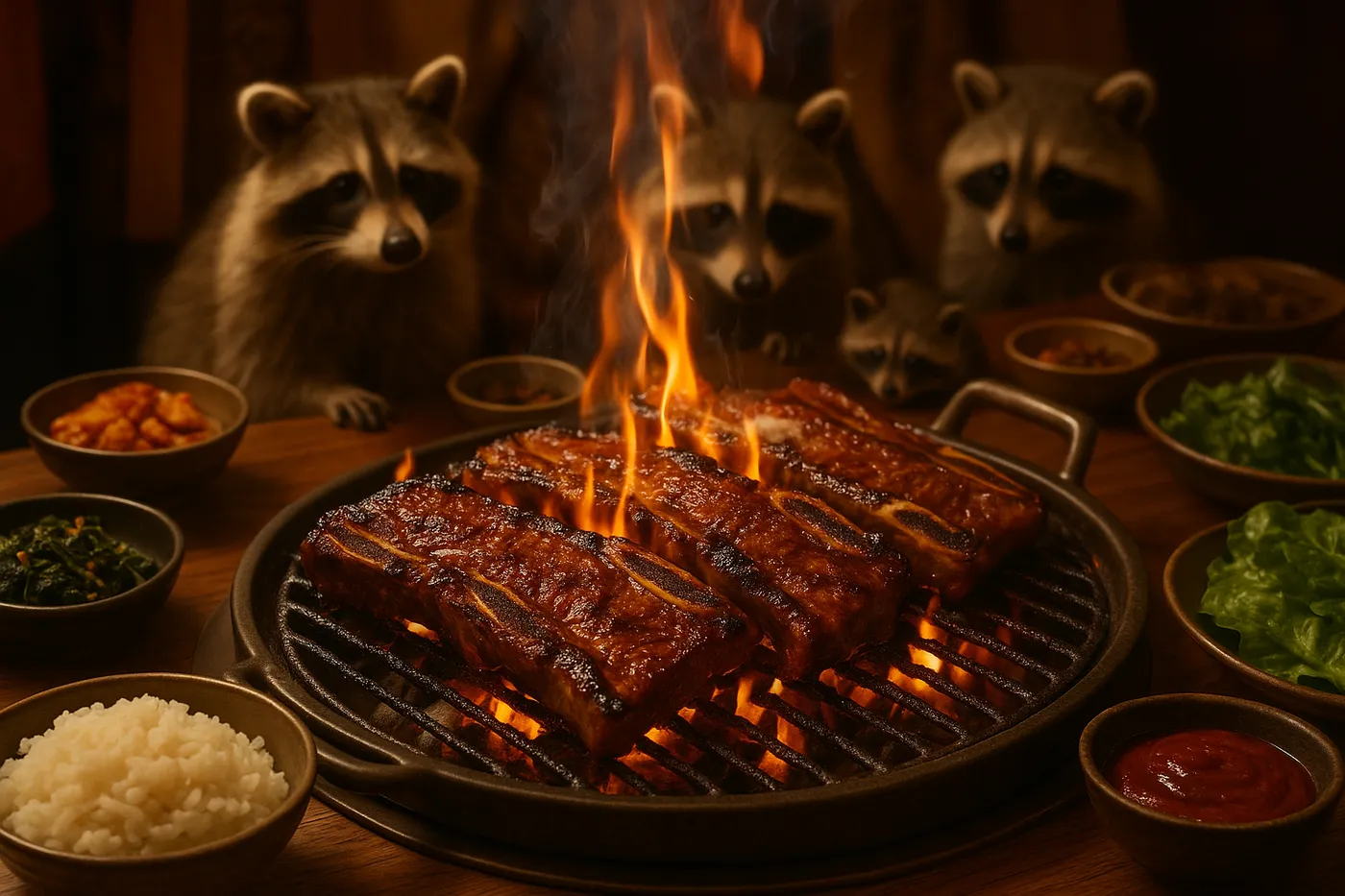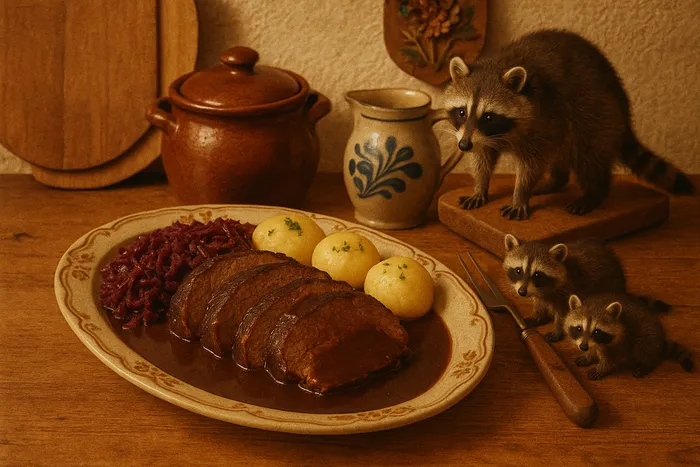
Korean galbi transforms tough short ribs into something tender enough to cut with chopsticks while maintaining enough structure to handle aggressive grilling. The secret lies in the marinade—a perfect balance of sweet, salty, and umami that penetrates deep into the meat during its long overnight bath.
This isn't just barbecue; it's Korean hospitality made edible. The sweetness comes from Asian pear and brown sugar, the depth from soy sauce and garlic, and the complexity from sesame oil and ginger. When it hits the hot grill, those sugars caramelize into a lacquered coating that's both beautiful and delicious.
Ingredients
For the short ribs:
🥩 4 pounds Korean-style short ribs (flanken cut)
🧅 1 medium onion, sliced
For the galbi marinade:
🍐 1 large Asian pear, peeled and grated
🥢 1/2 cup soy sauce
🍯 1/4 cup brown sugar
🫒 2 tablespoons sesame oil
🧄 6 cloves garlic, minced
🫚 2 tablespoons fresh ginger, minced
🧅 1/2 medium onion, grated
🌶️ 1 tablespoon gochugaru (Korean chili flakes)
🍶 2 tablespoons rice wine or mirin
🧂 1 teaspoon black pepper
🌰 2 tablespoons toasted sesame seeds
For serving:
🍚 Steamed white rice
🥬 Butter lettuce leaves
🥒 Quick-pickled cucumber
🌿 Scallions, chopped
🌶️ Gochujang for dipping
Instructions
Prepare the ribs properly. Korean-style short ribs should be cut flanken-style—across the bone in thin strips. If you can't find them pre-cut, ask your butcher to cut them 1/4 to 1/2 inch thick across the bones. Score the meat lightly with a knife to help the marinade penetrate.
Make the marinade. In a large bowl, combine grated Asian pear, soy sauce, brown sugar, sesame oil, minced garlic, minced ginger, grated onion, gochugaru, rice wine, black pepper, and sesame seeds. Whisk until the sugar dissolves completely.
Marinate overnight. Place short ribs and sliced onion in a large resealable bag or shallow dish. Pour marinade over the ribs, making sure every piece is well coated. Marinate in the refrigerator for at least 4 hours, but preferably overnight or up to 24 hours.
Bring to room temperature. Remove ribs from refrigerator 30 minutes before grilling to bring to room temperature. This ensures even cooking.
Prepare your grill. Heat grill to medium-high heat. Clean and oil the grates well—the marinade contains sugar that can stick and burn easily.
Grill with attention. Remove ribs from marinade, letting excess drip off. Grill for 2-3 minutes per side, watching carefully for flare-ups. The meat should develop a beautiful caramelized crust while remaining tender inside.
Don't overcook. The ribs are done when they have good char marks and the meat is tender. The flanken cut cooks quickly, so watch closely to avoid overcooking.
Rest briefly. Let the ribs rest for 2-3 minutes after grilling to allow juices to redistribute.
Serve Korean-style. Arrange on a platter with steamed rice, lettuce leaves for wrapping, pickled vegetables, and gochujang for dipping. Sprinkle with chopped scallions.
Galbi Marination Timeline
timeline
title Korean Galbi Process (4-24 Hours)
0:00 : Score Ribs Lightly
: Grate Asian Pear
0:15 : Mix Marinade
: Dissolve Sugar
0:30 : Coat Ribs Thoroughly
: Begin Marination
4:00 : Minimum Marination
: Can Cook Now
12:00 : Ideal Marination
: Flavors Deepened
24:00 : Maximum Marination
: Peak Tenderness
24:30 : Bring to Room Temp
: Prepare Grill
24:45 : Grill 2-3 min/side
: Watch for Flare-ups
flowchart LR
subgraph Prep["Preparation"]
A[Score Ribs<br/>for Penetration]
B[Grate Asian Pear<br/>for Enzymes]
C[Mix Marinade<br/>Ingredients]
end
subgraph Marinate["Marination Process"]
D[Coat All<br/>Ribs Well]
E[Refrigerate<br/>4-24 hours]
F[Turn Once<br/>if Possible]
end
subgraph Grill["Grilling"]
G[Room Temp<br/>30 min]
H[Clean & Oil<br/>Grates]
I[Medium-High<br/>Heat]
J[Grill 2-3 min<br/>Per Side]
K[Watch for<br/>Flare-ups]
L[Rest 2-3 min]
end
A --> B --> C --> D
D --> E --> F --> G
G --> I
H --> I
I --> J --> K --> L
style B fill:#69DB7C
style E fill:#868E96
style J fill:#FF6B6B
style K fill:#FD7E14
Critical Points:
- Asian pear enzymes are key - no substitutes work as well
- Sugar in marinade causes flare-ups - stay vigilant
- Thin flanken cut cooks fast - 2-3 minutes per side max
- Serve immediately for best texture
Technique Notes
The Asian pear is crucial—it contains enzymes that tenderize the meat while adding natural sweetness. Don't substitute regular pears; they won't have the same effect.
Watch for flare-ups when grilling. The marinade contains sugar that can cause flames. Move ribs to a cooler part of the grill if needed.
Korean short ribs cook much faster than American-style short ribs due to the thin cut. Don't walk away from the grill.
Marinade Science
The grated Asian pear contains natural enzymes that break down tough muscle fibers, making the meat incredibly tender. Combined with the acid in the rice wine, it creates the perfect tenderizing environment.
Soy sauce provides glutamates for umami depth, while sesame oil adds nutty richness that can't be replicated with other oils.
Serving Tradition
In Korea, galbi is eaten as part of a communal meal. Diners wrap pieces of grilled meat in lettuce leaves with rice and various banchan (side dishes), creating perfect bite-sized packages.
The meal is always social—cooking galbi is often done at the table on portable grills, making it as much about the experience as the food.
Storage & Make-Ahead
Marinated ribs keep in the refrigerator for up to 2 days. The flavor actually improves with longer marinating.
Cooked galbi can be refrigerated for 3 days and reheated gently, though it's best eaten fresh from the grill.
Remix Ideas
Spicy version: Double the gochugaru or add fresh Korean chilies to the marinade.
Fruit variations: Try using kiwi instead of Asian pear for different tenderizing enzymes.
Bulgogi style: Use the same marinade on thinly sliced ribeye for Korean bulgogi.
Vegetable galbi: Marinate thick slices of eggplant or mushrooms in the same sauce.
Perfect galbi should make you understand why Korean BBQ has conquered the world—the meat practically falls off the bone, the flavors are complex and balanced, and the social aspect of grilling and eating together turns a meal into an event. Serve alongside Korean Kimchi and Korean Scallion Pancakes for a complete Korean feast that celebrates the country's mastery of umami and fire.









